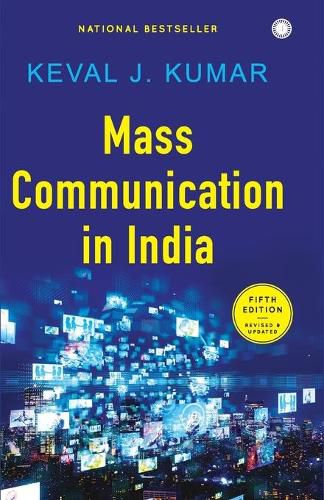Readings Newsletter
Become a Readings Member to make your shopping experience even easier.
Sign in or sign up for free!
You’re not far away from qualifying for FREE standard shipping within Australia
You’ve qualified for FREE standard shipping within Australia
The cart is loading…






This title is printed to order. This book may have been self-published. If so, we cannot guarantee the quality of the content. In the main most books will have gone through the editing process however some may not. We therefore suggest that you be aware of this before ordering this book. If in doubt check either the author or publisher’s details as we are unable to accept any returns unless they are faulty. Please contact us if you have any questions.
FIFTH EDITION REVISED & UPDATED The fourth ‘industrial revolution’ is already upon us. Mass communication has played a key role in the emergence and advancement of each of the four industrial revolutions.
Information and communication technologies (ICTs), from book publishing, the press and telegraph to cinema, recorded music, radio, television, computers, the internet and the mobile phone, have accelerated the diffusion and adoption of the many innovations spawned by these revolutions.
Mass Communication in India begins with an introduction to mass communication theory (Chapter 1); this is followed by dedicated chapters (2 to 8) on journalism, cinema, radio, television, music, book publishing and the folk media. The remaining chapters (9 to 14) are given over to advertising and public relations, media audiences, mass communication and society, development communication, IT, telecommunications and the internet, and intellectual property rights (IPR) related to the mass media. Each chapter ends with a comprehensive list of recent publications for further reading.
This fifth edition expands, revises and updates the critical analysis of both traditional mass media and the new digital social media in the context of the changing socio-cultural and political-economic scenario in India and around the world; the analysis is from the theoretical perspectives of political economy and cultural studies.
KEVAL J. KUMAR is an adjunct professor at MICA, Ahmedabad, and visiting faculty at IIM Indore and Flame University, Pune. Formerly, he was reader at Pune University and director at Symbiosis Institute of Media and Communication. He is the author of Media Education, Communication and Public Policy: An Indian Perspective and co-author of Environmentalism and the Mass Media: The North-South Divide. He has contributed entries to Wiley Blackwell’s international encyclopedias of
communication and over 50 research papers to edited books and journals.
$9.00 standard shipping within Australia
FREE standard shipping within Australia for orders over $100.00
Express & International shipping calculated at checkout
This title is printed to order. This book may have been self-published. If so, we cannot guarantee the quality of the content. In the main most books will have gone through the editing process however some may not. We therefore suggest that you be aware of this before ordering this book. If in doubt check either the author or publisher’s details as we are unable to accept any returns unless they are faulty. Please contact us if you have any questions.
FIFTH EDITION REVISED & UPDATED The fourth ‘industrial revolution’ is already upon us. Mass communication has played a key role in the emergence and advancement of each of the four industrial revolutions.
Information and communication technologies (ICTs), from book publishing, the press and telegraph to cinema, recorded music, radio, television, computers, the internet and the mobile phone, have accelerated the diffusion and adoption of the many innovations spawned by these revolutions.
Mass Communication in India begins with an introduction to mass communication theory (Chapter 1); this is followed by dedicated chapters (2 to 8) on journalism, cinema, radio, television, music, book publishing and the folk media. The remaining chapters (9 to 14) are given over to advertising and public relations, media audiences, mass communication and society, development communication, IT, telecommunications and the internet, and intellectual property rights (IPR) related to the mass media. Each chapter ends with a comprehensive list of recent publications for further reading.
This fifth edition expands, revises and updates the critical analysis of both traditional mass media and the new digital social media in the context of the changing socio-cultural and political-economic scenario in India and around the world; the analysis is from the theoretical perspectives of political economy and cultural studies.
KEVAL J. KUMAR is an adjunct professor at MICA, Ahmedabad, and visiting faculty at IIM Indore and Flame University, Pune. Formerly, he was reader at Pune University and director at Symbiosis Institute of Media and Communication. He is the author of Media Education, Communication and Public Policy: An Indian Perspective and co-author of Environmentalism and the Mass Media: The North-South Divide. He has contributed entries to Wiley Blackwell’s international encyclopedias of
communication and over 50 research papers to edited books and journals.